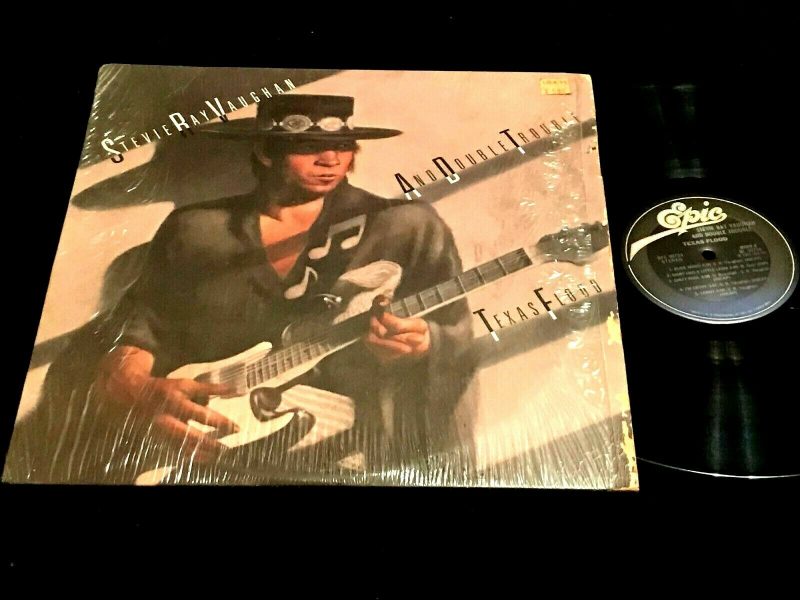Stevie Ray Vaughan Vinyl Records Lps For Sale
Check out these new and used Stevie Ray Vaughan vinyl records LPs for sale. We recommend starting your Stevie Ray Vaughan vinyl collection with the essential albums COULDN’T STAND THE WEATHER, Double Trouble TEXAS FLOOD and Soul To Soul. Our inventory is always changing, so check back often, or browse our list of vinyl records for sale from blues musicians.

Stevie Ray Vaughan: A Guitar Virtuoso’s Journey Through the Blues
In the hallowed halls of blues history, few names shine as brightly as Stevie Ray Vaughan. Born on October 3, 1954, in Dallas, Texas, Vaughan emerged as a beacon of the blues during an era when the genre was experiencing a renaissance. His unparalleled guitar virtuosity, soulful vocals, and passionate performances not only revitalized the blues but also left an indelible mark on the landscape of contemporary music. This article explores the life, music, and enduring legacy of Stevie Ray Vaughan.
Early Years and Influences:
Stevie Ray Vaughan’s introduction to music was an intrinsic part of his upbringing. Raised in a musically inclined family, he was exposed to a diverse array of genres, from jazz to rock to blues. However, it was the blues that would eventually capture his heart and become the guiding force of his musical journey.
Vaughan’s older brother, Jimmie Vaughan, was an influential figure in shaping his musical tastes. Jimmie, an accomplished guitarist himself, introduced Stevie to the blues greats, including B.B. King, Albert King, and Freddie King. The King triumvirate became Stevie’s trinity, shaping his early guitar style and infusing his playing with the soulful nuances that would define his later work.
Struggles and Triumphs:
Vaughan’s journey through the blues was not without its struggles. The 1970s saw him paying his dues in the Austin music scene, performing with various bands and facing the challenges that come with the nomadic life of a struggling musician. Despite the hardships, Vaughan’s commitment to his craft was unwavering.
In 1982, Stevie Ray Vaughan and Double Trouble released their debut album, “Texas Flood,” a title that not only paid homage to his home state but also marked the beginning of a meteoric rise. The album, characterized by blistering guitar solos and Vaughan’s emotive vocals, catapulted him to the forefront of the blues revival.
Texas Flood and the Blues Revival:
“Texas Flood” was a watershed moment for Stevie Ray Vaughan, earning critical acclaim and introducing him to a broader audience. The album showcased his virtuosic guitar playing, fusing the raw intensity of the blues with a contemporary energy that resonated with listeners. The title track, a cover of Larry Davis’s song, became an anthem, solidifying Vaughan’s place as a blues force to be reckoned with.
The success of “Texas Flood” coincided with a renewed interest in the blues during the 1980s. As popular music trended towards synthesizers and electronic production, Vaughan’s unapologetic commitment to the blues struck a chord with audiences hungry for authenticity. His scorching guitar solos, gritty vocals, and a stage presence that exuded passion and authenticity set him apart in an era dominated by MTV and synthesizer-driven pop.
Guitar Virtuosity:
At the heart of Stevie Ray Vaughan’s sonic identity was his mastery of the guitar. Often referred to as a modern-day blues guitar virtuoso, Vaughan’s playing was characterized by blistering speed, soulful bends, and an uncanny ability to convey a myriad of emotions through his instrument. His guitar of choice, “Number One,” a 1962/63 Fender Stratocaster, became an extension of his soul.
Vaughan’s approach to the guitar was deeply rooted in blues tradition, yet he brought a contemporary edge that spoke to a new generation of listeners. His rapid-fire picking, expressive vibrato, and seamless blending of various blues styles showcased not only his technical prowess but also his deep understanding of the genre’s rich history.
Influence and Recognition:
Stevie Ray Vaughan’s impact on the blues and rock genres was immeasurable. His influence extended beyond his own discography, shaping the sound of countless guitarists who sought to emulate his fiery style. Vaughan’s reverence for the blues masters of the past was evident in his playing, yet he managed to push the genre forward, injecting it with a vitality that appealed to a broad audience.
His recognition as a guitar virtuoso was solidified by awards and accolades. Vaughan received six Grammy Awards, including one for his riveting instrumental performance of “Riviera Paradise.” His contributions to contemporary blues music earned him a place in the Blues Hall of Fame, and Rolling Stone magazine consistently ranked him among the greatest guitarists of all time.
Life on the Edge:
Vaughan’s rise to stardom was not without its challenges, and his personal life was marked by struggles with substance abuse. In the midst of his musical triumphs, he battled demons that often accompany the pressures of fame. His commitment to sobriety and his journey towards recovery became an integral part of his narrative.
The 1980s were a tumultuous period for Vaughan, punctuated by moments of brilliance on stage and personal turmoil off stage. His struggles with addiction reached a critical point, leading to a stint in rehabilitation in the mid-1980s. Vaughan’s determination to overcome his challenges spoke to the resilience that fueled his music.
Collaborations and Crossroads:
Stevie Ray Vaughan’s collaborative spirit was evident in his work with various artists, showcasing his versatility and ability to transcend musical boundaries. One of the most notable collaborations was with the legendary blues guitarist, Albert King. Their live performance, captured on the album “In Session,” was a meeting of blues titans, with Vaughan’s fiery playing complementing King’s seasoned style.
Another iconic moment in Vaughan’s career was his participation in the “Crossroads Guitar Festival” in 1986, organized by Eric Clapton. This event brought together some of the finest guitarists across genres, and Vaughan’s electrifying performance solidified his status as a guitar maestro. The festival highlighted his ability to seamlessly navigate the realms of blues, rock, and beyond.
Tragic End and Enduring Legacy:
The zenith of Stevie Ray Vaughan’s career was tragically cut short on August 27, 1990, following a performance at the Alpine Valley Music Theatre in Wisconsin. A helicopter crash claimed the lives of Vaughan and several members of Eric Clapton’s touring entourage. The music world mourned the loss of a true virtuoso, taken from the stage at the height of his powers.
While his life was tragically brief, Stevie Ray Vaughan’s legacy endures through his recordings, live performances, and the indelible mark he left on the blues genre. His influence on a new generation of guitarists is evident in the countless musicians who continue to draw inspiration from his style. The annual “Stevie Ray Vaughan Remembrance Ride and Concert” in Austin, Texas, pays tribute to his memory and contributions to the blues.
Conclusion: The Resonance of Stevie Ray Vaughan’s Blues:
Stevie Ray Vaughan’s impact on the blues was not confined to the 1980s; it reverberates through the fabric of contemporary music. His virtuosity, emotional depth, and commitment to the authenticity of the blues ensured that his legacy remained undiminished. In a genre that has seen its share of luminaries, Stevie Ray Vaughan stands as a torchbearer, a modern-day bluesman who breathed new life into the age-old art form.
His enduring influence extends beyond the notes he played on “Texas Flood” or the searing solos of “Pride and Joy.” It resides in the hearts of musicians who pick up a guitar and seek to capture the soul-stirring essence of the blues. Stevie Ray Vaughan’s journey through the blues was more than a musical odyssey; it was a testament to the enduring power of a genre that has the ability to speak to the deepest recesses of the human experience.
In the end, Stevie Ray Vaughan’s blues were not just about the guitar licks or the raspy vocals; they were about connection, emotion, and an unyielding passion for the music that fueled his soul. As long as the blues echo through dimly lit clubs and expansive concert halls, the spirit of Stevie Ray Vaughan will continue to resonate, a timeless force in the ever-evolving tapestry of American music.
STEVIE RAY VAUGHAN - LIVE ALIVE - 180-GRAM VINYL 2-LP SET " NEW, SEALED "
 | $38.98 Buy It on eBay for only: $38.98 Buy It Now on eBay |
STEVIE RAY VAUGHAN - COULDN'T STAND THE WEATHER - 180-GRAM VINYL 2-LP SET "NEW "
 | $37.98 Buy It on eBay for only: $37.98 Buy It Now on eBay |
STEVIE RAY VAUGHAN -VAUGHAN BROTHERS FAMILY STYLE - 180-GRAM BLUE VINYL LP " NEW
 | $31.98 Buy It on eBay for only: $31.98 Buy It Now on eBay |
STEVIE RAY VAUGHAN SOUL TO SOUL - 180-GRAM "RED" VINYL LP " NEW, SEALED "
 | $33.98 Buy It on eBay for only: $33.98 Buy It Now on eBay |
Stevie Ray Vaughan - Sky Is Crying [New Vinyl LP] 180 Gram, Holland - Import
 | $33.35 Buy It on eBay for only: $33.35 Buy It Now on eBay |
'68 STEVIE RAY VAUGHAN "LONG WAY TO GO" RARE MINT PROMO CAST OF THOUSANDS 45/SLV
 | $14.99 End Date: Sunday Jul-06-2025 19:20:01 EDT Buy It on eBay for only: $14.99 Buy It Now on eBay |
VINYL Stevie Ray Vaughan, Double Trouble - Texas Flood
 | $29.40 Buy It on eBay for only: $29.40 Buy It Now on eBay |
Stevie Ray Vaughan - Live Alive [New Vinyl LP] Holland - Import
 | $39.27 Buy It on eBay for only: $39.27 Buy It Now on eBay |
Stevie Ray Vaughan - Couldn't Stand The Weather #39304 VG+ - FREE SHIPPING
 | $26.00 Buy It on eBay for only: $26.00 Buy It Now on eBay |
The Essential Stevie Ray Vaughan And Double Trouble NEW Sealed Vinyl
 | $30.99 Buy It on eBay for only: $30.99 Buy It Now on eBay |
Stevie Ray Vaughan - Martin Scorsese Presents The Blues - Limited 180-Gram Trans
 | $44.87 Buy It on eBay for only: $44.87 Buy It Now on eBay |
STEVIE RAY VAUGHAN and Double Trouble VOODOO CHILE DEMO EP 3 TRACKS 1984 SRV
 | $29.95 Buy It on eBay for only: $29.95 Buy It Now on eBay |
STEVIE RAY VAUGHAN - MARTIN SCORSESE PRESENTS THE BLUES - 180-GRAM BLUE 2-LP SET
 | $46.98 Buy It on eBay for only: $46.98 Buy It Now on eBay |
Stevie Ray Vaughan And Double Trouble - In Step Analogue Productions NEW
 | $42.99 Buy It on eBay for only: $42.99 Buy It Now on eBay |
Albert King & Stevie Ray Vaughan In Session Analogue Productions 2LP 45 RPM 180G
 | $149.99 Buy It on eBay for only: $149.99 Buy It Now on eBay |
STEVIE RAY VAUGHAN & DOUBLE TROUBLE IN STEP NEW LP
 | $39.35 Buy It on eBay for only: $39.35 Buy It Now on eBay |
Stevie Ray Vaughan And Double Trouble – Couldn't Stand The Weather - EU IMPORT
 | $9.99 End Date: Saturday Jul-05-2025 00:07:01 EDT Buy It on eBay for only: $9.99 Buy It Now on eBay |
STEVIE RAY VAUGHAN-THE ESSENTIAL STEVIE RAY VAUGHAN AND DOU NEW VINYL
 | $33.65 Buy It on eBay for only: $33.65 Buy It Now on eBay |
Stevie Ray Vaughan And Double Trouble ¨Couldn't Stand The Weather¨ VMP LP/Vinyl
 | $44.95 Buy It on eBay for only: $44.95 Buy It Now on eBay |
STEVIE RAY VAUGHAN & DOUBLE TROUBLE "SOUL TO SOUL" 180 G 2012 REISSUE LP NEW
 | $30.00 Buy It on eBay for only: $30.00 Buy It Now on eBay |















![Stevie Ray Vaughan and Double Trouble - The Sky Is Crying [Recorded Versions Guitar] #1](https://m.media-amazon.com/images/I/51S3oFNFNlL._SL100_.jpg)









![GNX[LP] #1](https://m.media-amazon.com/images/I/51EXnBFIdPL._SL100_.jpg)

![Back to Black [Vinyl] #1](https://m.media-amazon.com/images/I/61Db7-hQGKL._SL100_.jpg)


![Gold - Greatest Hits[2 LP] #1](https://m.media-amazon.com/images/I/51mGW9UohWL._SL100_.jpg)
![Gold - Greatest Hits[2 LP] #2](https://m.media-amazon.com/images/I/410sx7AtHuL._SL100_.jpg)
![Gold - Greatest Hits[2 LP] #3](https://m.media-amazon.com/images/I/41PywevsgbL._SL100_.jpg)





![[Exquisite Appearance] Built from wood and metal materials with a unique sense of layering; The streamlined corner design is truly atmospheric and stylish(Note: long hold the start button to turn the power on, and press again to start) [All in 1] Thi...](https://m.media-amazon.com/images/I/41vovGjFkeL._SL160_.jpg)






































